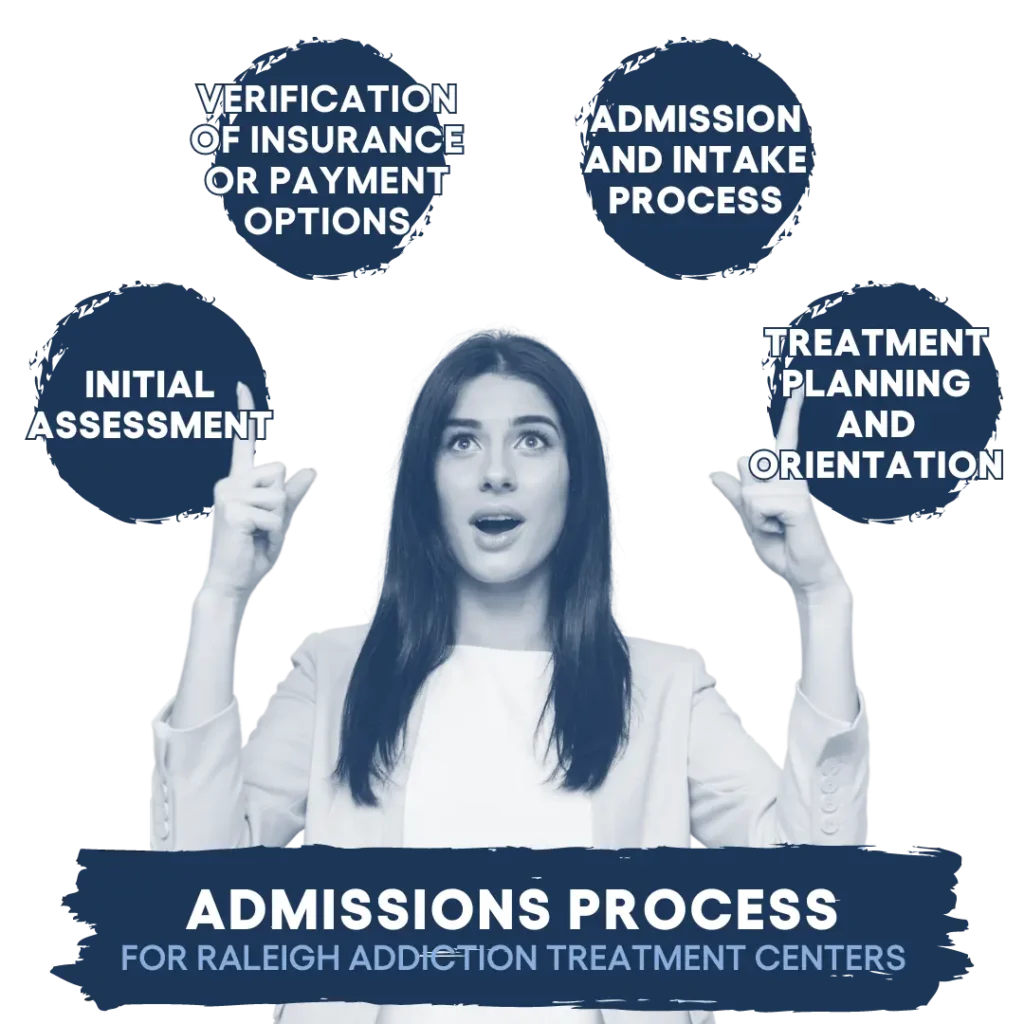If you are in the Raleigh area and need help with drug and alcohol addiction – call (704) 248-8561.

The capital of North Carolina, Raleigh, is known for being a part of the area called the “Research Triangle,” thanks to the number of technology and scholarly institutions found around Raleigh, Chapel Hill, and Durham. Home to North Carolina State University, there are thousands of students, residents, and tourists who come to Raleigh regularly.
Like the state, Raleigh residents are faced with addiction and mental health disorders. These can range in type and severity, including anxiety, depression, post-traumatic stress disorder (PTSD), drug addiction, and alcohol addiction. The city offers a wide range of treatment options for individuals struggling with drug and alcohol addiction and mental health disorders. These Raleigh rehab centers provide guidance, community-based support, program opportunities, and more – aiding the sobriety journey.
In Raleigh, North Carolina, there are many different types of drug and alcohol rehab facilities. These Raleigh rehab facilities offer a range of services to cater to different needs and preferences. Some common types of rehab facilities in Raleigh include:
Inpatient Rehab Centers: These facilities provide intensive, 24-hour care in a residential setting. Patients reside at the facility for the duration of their treatment, typically ranging from a few weeks to several months. Inpatient rehab centers offer structured therapy, medical supervision, and support to help individuals overcome addiction.
Outpatient Rehab Centers: Outpatient facilities allow patients to attend therapy and counseling sessions during the day while living at home or in a sober living environment. Outpatient rehab programs are suitable for individuals with mild to moderate addiction who do not require 24-hour supervision.
Detox Centers: Detoxification centers specialize in managing the withdrawal symptoms that occur when individuals stop using drugs or alcohol. These facilities provide medical supervision and support to help patients safely detoxify their bodies and stabilize before beginning formal treatment.
Dual Diagnosis Treatment Centers: Dual diagnosis facilities offer specialized care for individuals struggling with both substance abuse and co-occurring mental health disorders such as depression, anxiety, or bipolar disorder. These programs address both conditions simultaneously to improve overall treatment outcomes.
Holistic Rehab Centers: Holistic rehab centers incorporate alternative therapies and holistic approaches alongside traditional addiction treatment methods. These facilities may offer activities such as yoga, meditation, acupuncture, and nutritional counseling to promote overall well-being and recovery.
Gender-Specific Rehab Centers: Some rehab facilities in Raleigh cater exclusively to either men or women. Gender-specific treatment programs provide a supportive environment where individuals can address gender-specific issues and focus on recovery without distractions.
Faith-Based Rehab Centers: Faith-based rehab centers integrate religious teachings and principles into their treatment programs. These facilities may offer spiritual counseling, prayer sessions, and religious activities to help individuals strengthen their faith and find support within a religious community.
When seeking addiction treatment in Raleigh, North Carolina, it's important to look at several factors to ensure you or a loved one receives quality care and support. Considering these factors and conducting thorough research allows you to make an informed decision when selecting an addiction treatment facility that best meets your needs and supports your journey to recovery.
Here are 10 things to look for:
1. Accreditation and Licensing:
Ensure that the facility is accredited by reputable organizations such as the Joint Commission or the Commission on Accreditation of Rehabilitation Facilities (CARF). Licensing by the state of North Carolina is also essential to verify the facility’s legitimacy and adherence to quality standards.
2. Evidence-Based Practices:
Look for a treatment center that utilizes evidence-based practices supported by scientific research, such as cognitive-behavioral therapy (CBT), motivational interviewing (MI), and medication-assisted treatment (MAT). These approaches have been proven effective in treating addiction.
3. Customized Treatment Plans:
Seek a facility that offers personalized treatment plans tailored to individual needs and circumstances. A one-size-fits-all approach may not address the unique factors contributing to each person’s addiction.
4. Experienced and Qualified Staff:
Ensure that the treatment center employs licensed and experienced professionals, including doctors, therapists, counselors, and nurses, who specialize in addiction treatment. Staff credentials and qualifications should be readily available for review.
5. Continuum of Care:
Choose a facility that provides a continuum of care, including detoxification, residential or outpatient treatment, aftercare planning, and relapse prevention services. A comprehensive approach to treatment improves long-term outcomes and supports sustained recovery.
6. Dual Diagnosis Capabilities:
If you or your loved one has a co-occurring mental health disorder, such as depression or anxiety, select a facility with expertise in dual diagnosis treatment. Addressing both addiction and underlying mental health issues concurrently is critical for successful recovery.
7. Family Involvement and Support:
Look for a treatment center that involves family members in the recovery process through education, therapy, and family counseling sessions. Family support can significantly enhance the effectiveness of treatment and promote healing within the family unit.
8. Amenities and Environment:
Consider the facility’s amenities, accommodations, and environment to ensure they are conducive to healing and comfort. A welcoming and supportive atmosphere can positively impact the treatment experience and overall well-being.
9. Aftercare Services:
Evaluate the availability of aftercare services and support networks to help individuals transition back to daily life post-treatment. This may include sober living arrangements, alumni programs, support groups, and ongoing therapy sessions.
10. Reputation and Reviews:
Research the facility’s reputation by reading online reviews, testimonials, and independent ratings. Positive feedback from former clients and their families can provide valuable insights into the quality of care and outcomes achieved by the treatment center.

Raleigh has a number of community resources, including support groups, counseling services, sober living facilities, vocational training programs, legal assistance, and more for individuals who are dealing with substance abuse and mental health issues.
A few resources for help with addiction in Raleigh:
Substance Abuse Advisory Commission – Advocates for prevention, intervention, and treatment of alcohol, tobacco, and other drug use.
Southeastern Recovery Center – Drug and Alcohol Addiction Treatment
SAMHSA National Helpline – Confidential, free help from public health agencies to find more information on addiction and mental health resources.

The North Carolina Department of Health and Human Services reported that, on average, nine North Carolina residents died from drug overdoses every day in 2020. an average of nine North Carolina residents died each day from drug overdoses in 2020 – a 40% increase from 2019. In 2021, drug overdose deaths jumped by 72%, with 11 deaths per day.
Mental health is also a struggle for North Carolina residents – either as a single affliction or as part of a dual diagnosis. Residents have seen the rates of anxiety and depression skyrocket from 11% to 41% from 2019 to 2021.
Understanding North Carolina’s statistics on drug and alcohol addiction, as well as mental health disorders, can shed light on the struggles that exist for residents in Raleigh. These statistics have the ability to inform policy decisions, reallocate resources, and facilitate community interventions that are aimed at addressing addiction in the area.
Congratulations on taking the first step toward sober living! The admissions process for a Raleigh drug and alcohol rehabilitation center may vary depending on the internal processes of the facility, but in general, you can expect the following four steps:

The first step for individuals seeking treatment is to undergo an initial assessment. This assessment may begin with a phone call or an in-person meeting with an admissions counselor or intake coordinator. During this assessment, the individual will be asked about their substance use history, medical history, mental health concerns, and any previous treatment experiences. This assessment is to gather information to determine the most appropriate level of care and treatment plan for the individual.
After the initial assessment, the admissions team will assist in verifying insurance coverage or help with exploring other payment options. They will work with the individual to understand their financial situation and determine the best course of action for covering the cost of treatment. If the individual has insurance coverage, the admissions team will talk with the insurance provider to determine coverage for substance abuse treatment services.
Once the financial arrangements have been sorted out, the individual will proceed with the admission and intake process. This often involves completing paperwork, signing consent forms, and providing necessary personal information. The admissions team will also provide information about what to expect during treatment, including rules and expectations, daily schedules, and available support services.
After completing the admission and intake process, the individual will meet with a treatment team to develop a personalized treatment plan. This treatment plan will outline goals for recovery, as well as the specific therapies and interventions that will be used to achieve those goals. The individual will also go through an orientation to the rehab facility, including a tour of the facility and an introduction to staff members and fellow clients.
AA (Alcoholics Anonymous) and NA (Narcotics Anonymous) meetings are crucial in the sobriety journey. These meetings provide vital support for individuals struggling with addiction in Raleigh. They offer a safe and confidential space where individuals can share their experiences, struggles, and triumphs with others who understand firsthand the challenges of addiction.
By following these carefully crafted 12-step programs, participants gain valuable tools for maintaining sobriety and rebuilding their lives. These meetings offer a sense of community and belonging, nurturing connections with peers who offer empathy, encouragement, and accountability. When attending these meetings regularly and actively participating, individuals can break the cycle of addiction, rebuild their relationships, and reclaim control over their lives, ultimately achieving long-term sobriety and fulfillment.
To find local meetings, call 800-681-2956 – or check out a list below to get started.
To find local meetings (in-person and virtual), click here – or check out the list below.
With so much to do in Raleigh, it is easy to find sober-friendly activities and events in the area. Spending time outdoors, attending a local arts class or workshop, finding support group meetings, or experiencing cultural events – engaging in sober activities can promote social connections and enhance the recovery process.
Here are some sober activities you can do in Raleigh:

Paying for addiction treatment in Raleigh, NC, can feel overwhelming. When you aren’t sure how to cover costs, it can deter you from seeking help and treatment – but there are options that can help you pay for treatment, if you know where to look:

Many health insurance plans, including private insurance, Medicaid, and Medicare, offer coverage for addiction treatment services. Contact your insurance provider to inquire about coverage options, including inpatient rehab, outpatient therapy, medication-assisted treatment (MAT), and detoxification programs.

Some rehab facilities offer sliding scale fees based on income and ability to pay. This means that the cost of treatment is adjusted according to the individual's financial situation, making it more affordable for those with limited resources.

North Carolina provides state-funded addiction treatment programs for individuals who meet specific eligibility criteria, such as income level and residency requirements. These programs may offer low-cost or free treatment options.

If you have access to an Employee Assistance Program through your employer, you may be eligible for addiction treatment services covered by your workplace benefits. EAPs often provide counseling, referral services, and financial assistance for treatment.

Many rehab facilities in Raleigh offer payment plans or financing options to help individuals afford the cost of treatment. Payment plans allow you to spread out the expense of treatment over time, making it more manageable.

If you're unable to afford addiction treatment on your own, consider launching a crowdfunding campaign or organizing fundraising events with the help of friends, family, and community members. Online platforms can facilitate fundraising efforts to cover treatment expenses.
Raleigh offers a variety of addiction treatment programs, including inpatient rehab, outpatient rehab, detoxification programs, dual diagnosis treatment, holistic treatment, and more.
The duration of addiction treatment varies depending on individual needs and the severity of addiction. Treatment programs can range from a few weeks to several months.
Addiction treatment in Raleigh may include various therapeutic approaches such as cognitive-behavioral therapy (CBT), motivational interviewing (MI), dialectical behavior therapy (DBT), group therapy, family therapy, and experiential therapies.
Many rehab facilities in Raleigh accept health insurance, but coverage may vary depending on the provider and the specific treatment program. It's important to verify insurance coverage and inquire about payment options before enrolling in a program.
Rehab facilities in Raleigh often offer family therapy sessions, educational workshops, and support groups to involve family members in the treatment process. Family involvement can provide crucial support and improve treatment outcomes.
After completing a rehab program, individuals may participate in aftercare services such as sober living arrangements, outpatient therapy, support groups, and alumni programs to maintain sobriety and prevent relapse.

Finding the right alcohol rehab in Raleigh, NC can be a life-changing step toward recovery. With many treatment options available, understanding what to expect and how to choose the best program is key. This guide explains alcohol addiction, treatment options in Raleigh, and how to begin your recovery journey.
North Carolina, including Raleigh residents, are significantly concerned with the rates of alcohol use and addiction throughout the state. More than 4,500 North Carolina residents die from excessive drinking each year, and more than 25% of residents reported drinking an excess of seven alcoholic beverages per occasion at least four times per month. This type of excessive drinking has been linked to violence, alcohol poisoning, injury, liver disease, and developing alcohol use disorder (AUD).
The number of alcohol and substance abuse treatment facilities in North Carolina is growing – with over 600 of them as of 2020. This growth is attributed to the increase in alcohol use and substance abuse seen in the state. Every year, more facilities open to help residents overcome addiction and begin leading sober lives.
When comparing alcohol treatment centers in Raleigh, look for these key features: Accreditation and Licensing – Verify CARF or Joint Commission accreditation. Evidence-Based Therapies – Look for CBT, DBT, and medication-assisted treatment. Holistic Support – Yoga, mindfulness, nutrition, and trauma therapy. Qualified Staff – Licensed clinicians, addiction specialists, and medical professionals. Aftercare Planning – Relapse prevention and ongoing support post-treatment.
Tip: Always verify insurance coverage before admission. Many Raleigh alcohol rehabs accept private insurance, Medicaid, or offer payment plans.
When seeking addiction treatment in Raleigh, North Carolina, it's important to look at several factors to ensure you or a loved one receives quality care and support. Considering these factors and conducting thorough research allows you to make an informed decision when selecting an addiction treatment facility that best meets your needs and supports your journey to recovery.
Causes of Alcohol Addiction
Genetic Predisposition
Research suggests that genetics play a significant role in the development of alcohol addiction. Individuals with a family history of alcoholism are at a higher risk of developing AUD themselves. Genetic factors can influence how the body metabolizes alcohol and how the brain responds to it.
Environmental Factors
Environmental influences such as upbringing, family dynamics, peer pressure, and cultural attitudes toward alcohol can contribute to the development of alcohol addiction. Exposure to heavy drinking within the family or social circles can increase the likelihood of problematic alcohol use.
Psychological Factors
Underlying mental health conditions such as depression, anxiety, trauma, or stress can increase the risk of alcohol addiction. Some individuals may use alcohol as a way to cope with emotional pain or distress, leading to dependency over time.
Neurochemical Factors
Alcohol affects neurotransmitter levels in the brain, particularly dopamine, which is associated with pleasure and reward. Chronic alcohol use can disrupt the brain’s natural reward system, leading to cravings and compulsive drinking behavior.
Social and Cultural Factors
Cultural norms and societal attitudes toward alcohol consumption can influence an individual’s drinking habits. In cultures where heavy drinking is normalized or encouraged, individuals may be more susceptible to developing alcohol addiction.
Early Exposure
Early initiation of alcohol use, especially during adolescence, is linked to a higher risk of developing alcohol addiction later in life. The teenage brain is still developing, and exposure to alcohol during this critical period can alter brain structure and function, increasing vulnerability to addiction.
Availability and Accessibility
Easy access to alcohol and frequent exposure to alcohol-related stimuli can contribute to the development of addiction. Factors such as the presence of alcohol outlets in the community and advertising/marketing of alcohol products can influence drinking behavior.
Peer Influence
Peer pressure and social influences can play a significant role in shaping alcohol consumption patterns, particularly during adolescence and young adulthood. Individuals may engage in heavy drinking to fit in with their peers or to seek social acceptance.
Behavioral Reinforcement
Positive experiences associated with alcohol consumption, such as socializing, relaxation, or stress relief, can reinforce drinking behavior and contribute to the development of addiction.
Signs of Alcohol Addiction
Increased Tolerance
Needing to drink more alcohol to achieve the desired effect or experiencing diminished effects with continued use. This can lead to consuming larger amounts of alcohol over time.
Withdrawal Symptoms
Experiencing physical or psychological withdrawal symptoms when alcohol consumption is reduced or stopped. Withdrawal symptoms may include anxiety, irritability, tremors, sweating, nausea, vomiting, insomnia, and in severe cases, seizures or hallucinations.
Loss of Control
Being unable to control or limit alcohol consumption despite attempts to cut down or stop. Individuals with alcohol addiction may drink more than they intended or find it difficult to resist the urge to drink.
Preoccupation with Alcohol
Spending a significant amount of time thinking about, obtaining, or consuming alcohol. This preoccupation with alcohol may interfere with daily responsibilities, work, relationships, or hobbies.
Neglecting Responisbilities
Neglecting important obligations and responsibilities at work, school, or home due to alcohol use. This may include poor performance at work or school, neglecting household chores, or failing to fulfill parental or familial duties.
Continued Use Despite Negative Consequences
Persisting in alcohol use despite experiencing negative consequences, such as relationship problems, legal issues, financial difficulties, or health problems related to drinking.
Loss of Interest in Activities
Losing interest in activities or hobbies that were once enjoyable or important. Alcohol becomes the primary focus, leading to neglect of other interests and pursuits.
Social Withdrawal
Withdrawing from social activities, isolating oneself from friends, family, or social gatherings, or preferring to drink alone rather than in the company of others.
Secrecy and Lying
Engaging in secretive or deceptive behavior to hide the extent of alcohol consumption from others. This may include lying about drinking habits, sneaking alcohol, or hiding alcohol around the house or workplace.
Physical and Mental health Issues
Experiencing physical health problems such as liver disease, gastrointestinal issues, cardiovascular problems, or mental health issues such as depression, anxiety, or mood swings because of alcohol use.
Cravings
Experiencing strong cravings or urges to drink alcohol, especially in situations where it’s unavailable or when attempting to cut down or quit.

The Raleigh area offers many alcohol rehab centers, each offering a variety of treatment programs and approaches to help recovering addicts. When selecting a facility, it’s important to consider the rehab’s accreditation, treatment methods, qualifications, amenities, and success rates. By conducting thorough research, touring facilities, and making informed decisions – individuals struggling with addiction can work toward sobriety with an individualized treatment plan aligned with their goals.
An alcohol rehab program in Raleigh may include options for detox, therapy (individual, group, and family), medication management, holistic therapies, aftercare planning, and more. The duration and intensity of treatment may vary depending on the individual’s personal needs as outlined by the severity of their addiction. During the rehab process, individuals will receive support from trained professionals who will help them address the underlying factors contributing to their alcohol addiction.
Dedication and perseverance are a requirement of making a commitment to sobriety. Individuals who participate in alcohol rehab in Raleigh, NC, must actively engage in therapy sessions, adhere to the treatment protocols, and collaborate with their healthcare providers to achieve long-term recovery. Support from peers and loved ones can make a significant impact on how the rehabilitation journey turns out.

Alcohol rehab in Raleigh, NC, can be an expensive endeavor – but it should not be the reason that someone doesn’t seek treatment for alcohol addiction. There are many different payment options available to help anyone looking to attend an alcohol rehab be successful in their journey. If you are considering rehab, look into your insurance coverage first – determine what it will cover (if anything) and what facilities are in-network. If this isn’t an option, look at sliding fee pay schedules, payment assistance, payment plans, crowdfunding, or government programs designed to help individuals looking to get sober. Choosing the right financial arrangements can ease the overwhelming feeling that comes with seeking treatment, making it more accessible for everyone.

Completing alcohol rehab is a big achievement for those addicted to alcohol, but it also marks the beginning of a new chapter in life. Aftercare services are designed to help provide support in the form of ongoing therapy, support groups, and relapse prevention programs. These help individuals maintain sobriety and overcome challenges that can occur after they leave alcohol rehab in Raleigh, NC. Having a strong support system post-rehab and implementing coping strategies that were learned are important to maintain long-term success.
Aftercare for alcohol addiction plays a big role in maintaining recovery outside of the alcohol rehab facility. The facility offers security, which can quickly disappear once leaving a program. Raleigh alcohol rehab centers offer an assortment of aftercare options, including sober living homes, outpatient counseling, 12-step programs, SMART Recovery, and alumni support groups. Actively participating in aftercare services can help reinforce the skills and strategies that were learned in the rehab setting – making reentry into daily life easier.
Sometimes, formal treatment and aftercare services just aren’t enough to help Raleigh residents maintain sobriety. Additional support for alcohol addiction may be necessary, including attending educational programs, participating in community-based initiatives, communicating with peers in online forums, and calling helplines that are staffed by trained professionals. These resources can be valuable for an individual looking for information, encouragement, or guidance with recovery.
Raleigh offers a range of alcohol rehab programs, including inpatient/residential treatment, outpatient treatment, detoxification services, partial hospitalization programs, and aftercare support.
If you're struggling to control your alcohol consumption, experiencing negative consequences as a result of drinking, or finding it difficult to stop drinking despite your best efforts, you may benefit from alcohol rehab.
Alcohol rehab typically involves an initial assessment, detoxification (if necessary), therapy and counseling, participation in support groups, development of coping skills, and aftercare planning.
The duration of alcohol rehab varies depending on factors such as the severity of addiction, individual needs, and type of program. It can range from a few weeks to several months.
Many insurance plans offer coverage for alcohol rehab services. It's essential to check with your insurance provider to understand your coverage options and any out-of-pocket expenses.
Look for facilities accredited by organizations like the Commission on Accreditation of Rehabilitation Facilities (CARF) or the Joint Commission. Additionally, ensure that staff members are licensed and experienced in addiction treatment.
Some rehab programs in Raleigh may offer specialized services tailored to specific populations, such as LGBTQ+ individuals, veterans, adolescents, or individuals with co-occurring mental health disorders.
Alcohol rehab programs in Raleigh may offer various types of therapy, including cognitive-behavioral therapy (CBT), motivational interviewing, group therapy, family therapy, and holistic therapies like yoga or art therapy.

In 2021, North Carolina recorded 3,339 opioid overdose deaths, making up 84% of all drug overdose deaths in the state, which is higher than the national average of 75%. Effective recovery from drug and alcohol addiction requires a personalized approach. When seeking an addiction treatment facility in Raleigh, the experienced staff will assess your needs to determine the appropriate level of treatment. For many individuals, detoxification is the crucial first step towards long-term sobriety, although it is often misunderstood.
Detoxification, or detox, is the process of abstaining from drugs or alcohol to clear the body of these substances and manage withdrawal symptoms. Prolonged and heavy use of drugs or alcohol can lead to physical dependence, causing withdrawal symptoms when usage stops. The goal of detox is to cleanse the body of these substances while supporting the individual through the initial phase of recovery. While detox alone is not enough for long-term sobriety, it is a critical first step, followed by ongoing treatment and support such as therapy, counseling, support groups, and sometimes medication-assisted treatment to address underlying issues and sustain recovery.
Withdrawal symptoms during detox can vary based on factors such as the substance used, the duration and intensity of use, individual health, and the presence of any co-occurring conditions. Common withdrawal symptoms include:
1. Safety:
For individuals physically dependent on drugs or alcohol, detoxification is crucial for safety. Abruptly stopping certain substances can lead to severe, life-threatening withdrawal symptoms. Medical supervision during detox ensures that individuals receive the necessary care to manage any complications.
2. Health:
Prolonged substance abuse harms the body. Detox helps eliminate harmful substances, reducing the physical burden on organs like the liver, kidneys, and brain, thereby contributing to overall health and well-being.
3. Preparation for Treatment:
Detox serves as a foundational step in recovery. By clearing the mind and body of substances, individuals can engage more effectively in subsequent therapy, counseling, and other forms of addiction treatment.
4. Reducing Cravings:
Detox can help reduce the severity of cravings, making it easier for individuals to resist relapse and maintain sobriety.
5. Motivation:
Successfully completing detox can motivate individuals to continue their recovery journey, reinforcing their desire to break free from addiction.

When going through detoxification in Raleigh, NC, individuals can expect a structured and supportive environment designed to help them safely withdraw from drugs or alcohol. Individuals can expect a supportive and compassionate environment where their safety, comfort, and well-being are prioritized as they take the first step toward recovery from addiction.
Upon admission, individuals undergo a thorough and comprehensive assessment by medical professionals to evaluate various aspects of their health and substance use history. This includes detailed interviews, physical examinations, and psychological evaluations. The assessment helps in understanding the extent of substance use, the type of substances involved, the duration of use, and any co-occurring medical or psychological conditions. This detailed information is crucial in determining the most appropriate detoxification approach, ensuring that the treatment plan is tailored to meet the specific needs of each individual.
Detox programs in Raleigh offer 24/7 medical supervision to ensure the safety and well-being of individuals undergoing detoxification. Highly trained medical staff are on hand around the clock to monitor vital signs, manage withdrawal symptoms, and address any medical complications that may arise. This constant supervision is vital as it allows for the early detection and treatment of any issues, minimizing the risk of severe complications. Medications may be administered to alleviate discomfort, reduce withdrawal symptoms, and prevent serious health risks such as seizures or severe dehydration. The presence of medical professionals also provides reassurance and support to individuals, helping them feel safer and more secure during the challenging detox process.
Withdrawal symptoms can vary widely depending on the type of substance used, the duration and intensity of use, and individual health factors. Detox programs are equipped to manage these symptoms through a combination of medical interventions and supportive care. Medical interventions may include the use of medications to reduce the severity of symptoms such as nausea, vomiting, tremors, anxiety, and insomnia. Supportive care includes providing a comfortable and safe environment, offering emotional support, and ensuring that individuals are well-hydrated and nourished. The goal is to make the detox process as manageable and comfortable as possible, reducing the physical and psychological burden on individuals as they go through withdrawal.
Detox can be an emotionally challenging experience, as individuals often face intense cravings, anxiety, depression, and mood swings as they withdraw from substances. Counseling and support groups are integral components of detox programs, providing individuals with the emotional support they need to cope with these challenges. Professional counselors and therapists offer one-on-one sessions to help individuals explore and address the underlying issues contributing to their addiction. Support groups provide a sense of community and shared experience, allowing individuals to connect with others who are going through similar challenges. This emotional support is crucial in helping individuals stay motivated and committed to their recovery journey.
Substance abuse can significantly impact physical health, often leading to malnutrition and other health problems. Detox programs provide nutritional support to help individuals replenish essential nutrients and promote overall well-being. This support may include balanced meals tailored to meet individual dietary needs, nutritional supplements, and counseling on healthy eating habits. Proper nutrition is essential for the body’s healing process, helping to restore energy levels, improve mood, and support overall physical health. By addressing nutritional needs, detox programs help individuals build a strong foundation for recovery.
Education is a key component of detox programs, helping individuals understand addiction, withdrawal, and the recovery process. Educational sessions provide valuable information on the physical and psychological aspects of addiction, the effects of substance use on the body, and the importance of maintaining sobriety. Detox programs also focus on discharge planning, helping individuals transition to further treatment or support services. This planning includes developing a personalized aftercare plan, identifying potential triggers and coping strategies, and connecting individuals with ongoing therapy, counseling, support groups, or medication-assisted treatment. The goal is to equip individuals with the knowledge and tools they need to continue their recovery journey successfully.
Detox programs in Raleigh prioritize the privacy and confidentiality of individuals seeking treatment. Personal information is kept confidential in accordance with legal and ethical guidelines to ensure the privacy and dignity of those undergoing detox. This commitment to confidentiality helps create a safe and trusting environment where individuals can feel comfortable sharing their experiences and concerns. By respecting privacy and confidentiality, detox programs support individuals in focusing on their recovery without fear of judgment or exposure.
The timeline for detoxification varies depending on factors such as the substance used, the duration and intensity of use, and individual health. While the timeline below provides a generalized outline of the detox experience, it is important to understand that individual experiences may differ:

Choosing a detox facility in Raleigh is a critical step in the recovery process. Centers like Southeastern Recovery Center offer 24/7 medical supervision, personalized care plans, and therapeutic activities to address both physical and emotional aspects of detoxification. Local facilities provide the convenience of being close to home, allowing family members to be actively involved in the recovery process, which is essential for long-term success.
If you are considering a detox program in or near Raleigh, contact Southeastern Recovery Center for more information.
